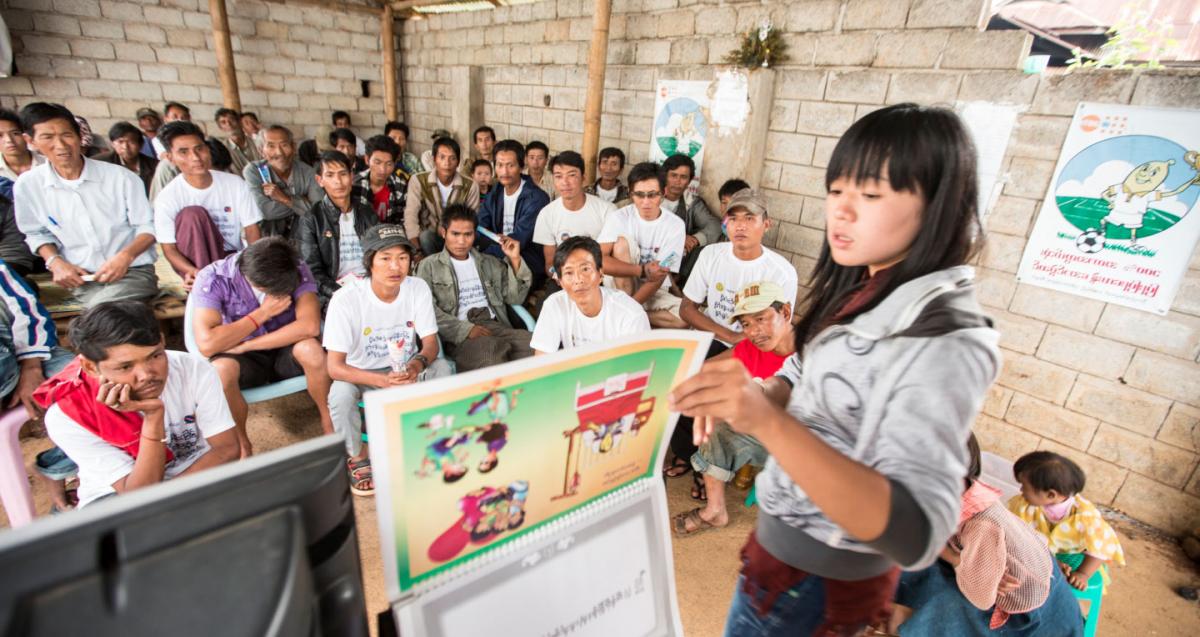Ma Phyu Phyu Phyo is a caregiver from Pyi Gyi Khin’s Pathein HIV/AIDS project, which aims to improve the quality of life of people living with HIV through psychosocial support with counselling and home based care.
Ko Toe (not his real name) was able successfully to quit drinking and adhere to antiretroviral treatment (ART) due to Ma Phyu Phyu Phyo’s skilful counselling, sincere care and psychosocial support—although it took much patience and several visits to his home.
“Ko Toe’s wife left him and he returned to his old habit of drinking. He missed doses of ART and was at risk of developing ART drug resistance,” Ma Phyu Phyu Phyo says. It was her sincere wish that he could live a normal life with an improved quality of life, and so she did not give up easily.
She continued to explain how she finally succeeded. “When I visited his home, he was drunk. So I came back. I visited his home many times for a chance to convince him of the importance of treatment adherence when he was not drunk.”
After four months on ART, Ko Toe’s health was much improved and he no longer suffered from any side effects.
Ko Toe was born in Pathein and is the youngest in his family. His parents were merchants and their family was quite well off. “I got everything I wanted as my mother loved me the most and never asked me to help with household chores. I finally passed my matriculation,” Ko Toe reflected.
After his matriculation he started drinking, being unable to resist the influence of his peers, and he lost interest in his studies. He also fell in love with a girl whom he married despite his mother’s protests, since both of them were still very young.
Young, inexperienced and unprepared, Ko Toe lost his way when he faced some stormy days in life – his father passed away, his mother got remarried to a truck driver whom Ko Toe hated, and his first wife left him.
In search of consolation, he started to visit massage parlours, drank every night and enjoyed pleasure with multiple partners—the illusion of a rosy life. He brought home his second wife who worked at a massage parlour.
“I did not know about safer sex then and so I never used a condom to protect myself,” Ko Toe remembers sadly, thinking about how his lack of knowledge of safer sex put him at risk of HIV. Later his illusion of a rosy life turned out in reality to be a bed of thorns—he became ill, developed a cough with blood, herpes and thrush.
A colleague from Pyi Gyi Khin learnt about him and helped him have a blood test for HIV. “It was explained to me about how HIV is transmitted and I had a blood test at Pyi Gyi Khin, as I had been at risk. I dared not get the result and put it off for a month for fear that it might be positive.”
When the result came back positive as he had feared, he felt so depressed. He now feels that he would not have survived those helpless days without the sincere care from Pyi Gyi Khin staff and psychosocial support from his peer network as a member of Pyi Gyi Khin’s ‘Arr Man Thit’ self-help group.
“I was invited to volunteer for the Arr Man Thit self-help group and I eventually became a member. From the health education and counselling sessions, I gained valuable knowledge on safer sex and how to use a condom. They explained to me about the symptoms of TB, and about ART and its potential side effects.”
“I wanted to protect my partner from becoming infected,” continues Ko Toe, reflecting his newly formed sense of responsibility to prevent further transmission of HIV to others—especially his wife, who is HIV negative.
Ko Toe would like to thank all the staff and volunteers from Pyi Gyi Khin who have extended their sincere care and support. “They have shone light to help people like me find our way back with a new purpose in life. I wish more and more success for Pyi Gyi Khin’s HIV project, and that all those who are in need of ART can start it when they need it.”
Pyi Gyi Khin has been running its project entitled ‘Enhancing the quality of life of people living with HIV through psychosocial support, home based care and increased access to prevention services among MSM/SW and in collaboration with NAP to promote the ART Programme (NFM) in Myanmar’ since 2011, with support from the Global Fund.



